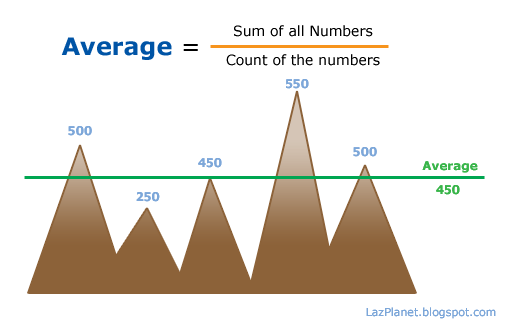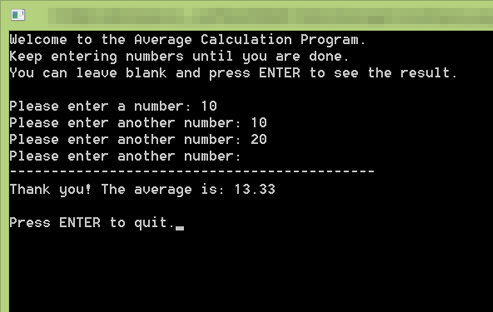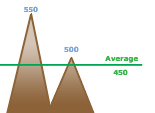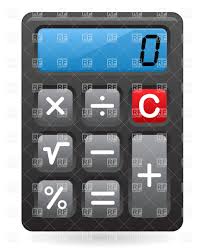We have seen a lot of average calculation programs. They have limit to their numbers of input. So we have a code that will let you enter number to your heart’s content.
Do you know how to calculate average? How do we do it in Lazarus / Free pascal?
Average is the number which we get by dividing the sum of numbers by the count of the numbers. The average number helps us to get an overall look at a whole bunch of numbers. If we get that the average height of the students of a class is 5.5’ (5 feet 5 inches) then we can understand that all the students have a height more or less than 5.5’.

The average calculation is a very easy one. We only need to add the numbers and store it in a variable. At the same time we need to keep the count of the numbers that have been entered. After the numbers are finished entering we need to just Divide the sum with the count of numbers. That’s it!
You can find many algorithms, functions, program codes that calculate the average, such as this one written by Tao Yue. It calculates the average for 5 numbers. It is a good program example for starters/beginners. But we go a step further. We’ll use a loop to get numbers from the user. User can type a number, press enter, type a number, press enter and so on.
When the user enters a blank input, we assume the user is done entering numbers and the program automatically calculates the average. This way the user can calculate the average for any number of integers.
See the code below:
Quick Tutorial
Start Lazarus.
Create a new Program Project (Project -> New Project -> Program -> OK).
Use the following free pascal code:
1 | program proj_avg_console; |
Run the program (F9 or Run -> Run).

You can enter as many numbers as you desire. When finished, just leave the input blank and press enter to calculate the average.
Explanation
1 | while (line <> '') do begin |
We use a while loop, because we want inputs until the user enters blank line. When the user enters a blank line, the while...do loop breaks and it continues the commands after the while block.
1 | val(line, num, code); |
Val returns non-zero integer if a non-number character is found. If the number inputted is a number and does not contain letters or invalid characters, it will return 0 (zero). We use Val function as a input validation/error handling procedure. If the user enters anything that is not number, the program will output ‘Invalid Number.’
1 | sum: single; |
The count integer holds the count of numbers and sum holds the sum total of all the numbers entered. When I told you that it can take input of unlimited numbers, I was lying. It is impossible to hold unlimited numbers. Because, computer memory is limited to some numbers. But modern day RAMs are more than enough for gigantic calculations. In the above code you can declare count as double, extended or even Comp to handle bigger calculations.
With the count being an integer in the code above, it can hold a number from -32768 upto 32767. That means the program can average up to 32767 numbers. Which should be more than enough. By the way, similar to count, you can also declare sum as single, double or Comp to extend its capability. See details about types here.
1 | if count <> 0 then |
If the count is zero then we cannot do division for calculating. If we divide any number with zero then it will raise an error. So we skip the division if count is zero (that means when no number is entered). Then average returns zero.
1 | WriteLn('Thank you! The average is: ' + FormatFloat('0.00', average)); |
The average variable is a single type variable. Why did we use single? Because since we are dividing numbers, the result can be a decimal point. We need a string to use in the WriteLn procedure. Also outputting single directly may give us a weird output. The FormatFloat function does 2 things:
1, it converts the number into float format given and
2, it turns it into a string.
So this function is perfect for our needs! You can change the format to '0.0000' to show four decimal points of the average.
You can also make an average calculation function based on this code.
Downloads
You can download the source code for the tutorial project and executable/EXE files from the links below:





